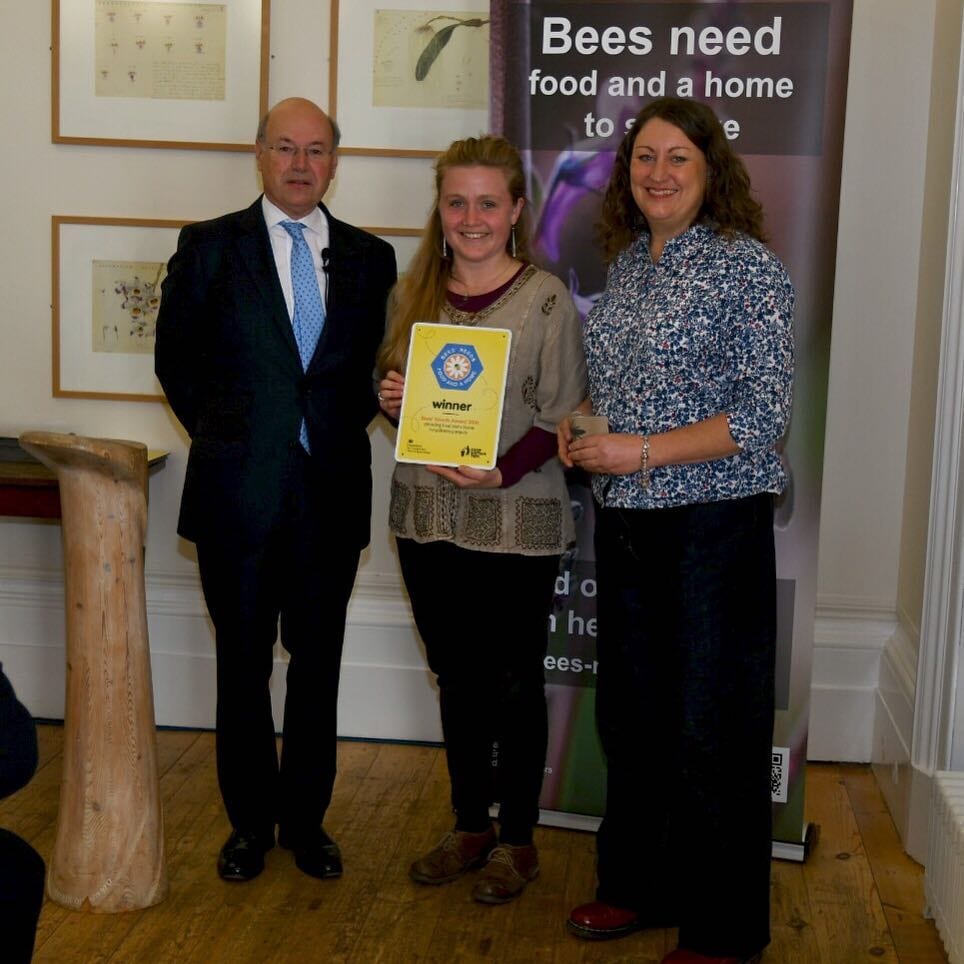The beautiful Rainbow Meadow outside Royal Fort House has won the Bees Needs Champion 2018 award!
The annual wildflower meadow is part of the ‘My Wild City’ project – a scheme by Avon Wildlife Trust launched in 2015 as part of the #GetBristolBuzzing campaign. The #MyWildUniversity initiative, works within the #MyWildCity framework and is a commitment set out by the External Estates Department to work within and adopt this strategically across our landscapes within the University of Bristol. This exciting collaboration has combined research from the Life Sciences department at the University and the National Pollinator Strategy for England, and has been brought about by the wonderful Royal Fort Estates Team and students from Roots Community Gardening – a student-led volunteering group who promote positive mental health and wellbeing by encouraging more students to connect with nature and their local community.
The recognition by DEFRA and Keep Britain Tidy for the project’s contribution to pollinators and the local community has been a huge honour. The award ceremony was hosted by the Royal Botanic Gardens (Kew) on the 13th November 2018, during which representatives from 26 Green Flag awarded projects were presented with the Bees Needs Champion award by Lord Gardiner (Parliamentary Under Secretary of State for rural Affairs and Biosecurity):
“I urge everyone to be inspired by this year’s Bees Needs Champions and take pollinator protection into their own hands through simple actions such as growing more flowers, cutting grass less often and thinking carefully about using pesticides.”
It was hugely inspiring to see the wide range of groups, organisations and individuals (councils, conservation charities, academic institutions and the Pollinator Advisory Steering Group) from across the country taking action to help pollinators and conserve the crucial ecological service they provide. The day included a number of speeches about the work that is being done to protect our pollinating insects, including; Philip Turvil and Richard Pollard from Grow Wild; Huw Merriman from the All Party Parliamentary Group for Bees; Hauke Koch and Phil Stevenson conducting scientific research projects at Kew; the Northumberland Honey company; and Dr Lynn Dicks from the University of East Anglia.
“The economic value of pollination is currently estimated at between $235-577 billion globally. A study in 2011 found that two-thirds of the crop pollination service is provided by wild pollinators, not by managed honey bees (Breeze et al., 2011). It is therefore important that we work to preserve landscapes that support common wild pollinators in the long term, by providing the food and nesting resources they need at the appropriate scale.” – Dr Lynn Dicks
We are extremely proud of the work that’s gone into achieving this award and want to say thank you and well done to all involved. Furthermore, whether you are a farmer, a gardener, or a manager of urban or amenity spaces, there is something you can do to help support our valuable insect pollinators.
There are five simple steps you can take to help pollinators in your area:
- Plant for pollinators
Grow more nectar- and pollen-rich flowers, shrubs and trees - Leave patches of land to grow wild
Wildflowers are important for insects and undisturbed areas make good nesting sites - Put away the pesticides
They can harm bees and other beneficial invertebrates - Leave your mower in the shed
Cut grass less often to allow plants to flower. If possible remove the cuttings after you mow longer grass. - Make a bee house
Drill holes in a log or bundle up lengths of bamboo to provide nesting sites for solitary bees
Visit the Avon Wildlife Trust website to find out more about the Greater Bristol Pollinator Strategy and how you can become part of Get Bristol Buzzing campaign.



